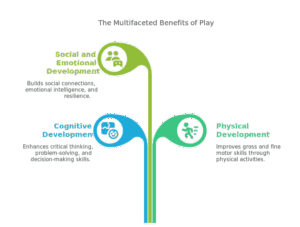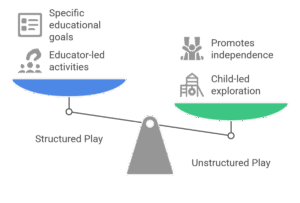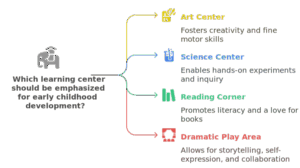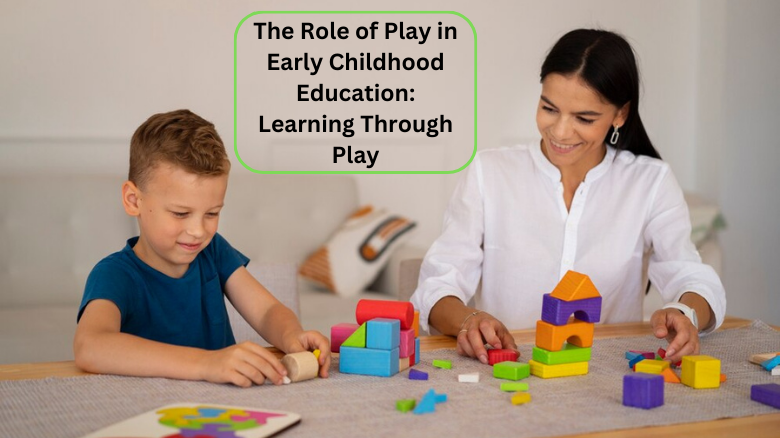Early childhood is a crucial period in human development. It's a time when children are incredibly receptive, curious, and eager to explore the world around them. One of the most effective and natural ways for young children to learn and develop essential skills is through play in early childhood education. At Epistemo Vikas Leadership School, we recognize the profound impact of play on early childhood education and integrate it seamlessly into our curriculum to foster holistic development through educational play and experiential learning.
Understanding the Importance of Play

Play is an essential element of early education that encourages children to think critically, solve problems, and make decisions. Activities such as puzzles, building blocks, and role-playing games stimulate cognitive development. Children understand patterns, cause and effect, and essential problem-solving strategies. For example, constructing a tower of blocks teaches them about balance, gravity, and spatial awareness, illustrating the role of play in learning. It also highlights the importance of play-based learning in preschool and explains play's relevance in the present time.
Physical Development
Play develops both gross and fine motor skills. Outdoor activities like running, jumping, and climbing enhance coordination, strength, and physical fitness. At the same time, fine motor skills are sharpened through tasks like drawing, cutting, and using small tools. These foundational skills support later academic tasks such as writing and handling classroom materials. This is especially relevant in early childhood learning through play and learning through play in the early years.
Social and Emotional Development
Play is a powerful platform for building social connections and emotional intelligence. Collaborative activities teach children to share, take turns, negotiate, and understand social norms. Emotionally, it helps children express themselves, handle stress, and build resilience. Through role-playing, children can explore emotions and real-life situations in a safe environment, preparing them for future interactions and reinforcing the importance of play in early childhood education. This also demonstrates the functions of play in emotional growth and the role of teachers in shaping global leaders.
Learning Through Play at Epistemo Vikas Leadership School
At Epistemo Vikas Leadership School, we integrate play across all learning experiences. Our philosophy is grounded in the belief that play-based learning fuels curiosity, fosters creativity, and lays the groundwork for lifelong learning. This approach reflects the growing emphasis on well-rounded child development and the powerful role of play in early education.
Structured and Unstructured Play

We incorporate a well-balanced combination of structured and unstructured play. Structured play is led by educators and focuses on specific educational goals. For instance, a guided scavenger hunt introduces children to nature and wildlife. Conversely, unstructured play empowers children to explore freely, make decisions, and use their imaginations, promoting independence and innovation. This balance exemplifies the concept of child-centric activity-based learning and highlights what role play has in shaping creative thinking.
To see how creativity is fostered in educational settings, read Fostering Creativity in the Classroom.
Play-Based Learning Centers

Each of our classrooms features designated learning centers that support different areas of development:
- The art center fosters creativity and fine motor skills.
- The science center enables hands-on experiments and inquiry.
- The reading corner promotes literacy and a love for books.
- The dramatic play area allows for storytelling, self-expression, and collaboration, highlighting the roles of play in development and answering what role of play in early childhood education.
Learn more about our activity-based learning approach.
Outdoor Play
Outdoor activities are a core part of our curriculum. Spacious playgrounds provide room for physical games, team-building exercises, and nature exploration. Children engage with the environment through activities like gardening, helping them learn about seasons, plant life, and ecology—important lessons from a play-centered perspective. Such experiences demonstrate how learning through play enriches real-world understanding.
Integration of Technology
To complement traditional play, we thoughtfully incorporate digital tools. Interactive educational apps and games help children learn letters, numbers, and problem-solving techniques. These are used in moderation to support—not replace—hands-on, sensory-rich learning, balancing modern tools with education through play.
Discover more about leveraging technology in early education.
Teacher Facilitation
Our educators actively participate in and guide play-based learning. They observe children’s interests and introduce relevant concepts through engaging questions and activities. For instance, a teacher may ask, "What do you think happens when we mix these colors?", prompting exploration and critical thinking. This approach builds on natural curiosity and shows the power of teaching through play.
Success Stories from Epistemo Vikas Leadership School
Our play-based approach consistently delivers positive outcomes. Many parents share stories of increased confidence, stronger communication skills, and improved academic readiness. One notable case involved a child with initial language challenges. Through participation in storytelling and role-play, the child gradually became a confident speaker, now eagerly engaging in discussions and reading aloud to classmates. These examples affirm the role of play in early childhood development and highlight how play education supports communication skills.
Explore how we support well-rounded development.
Why is Epistemo Unique?
Epistemo Vikas Leadership School offers a nurturing environment where each child’s natural curiosity is embraced through play-based learning. Our educators are skilled facilitators who guide children to make meaningful connections and develop a passion for discovery. This approach ensures a balanced, joyful, and effective educational journey rooted in the importance of play in education.
Our commitment to holistic development is reflected in our students’ achievements. Parents consistently note improvements in social interaction, emotional resilience, and academic preparedness, showcasing how incorporating play into early childhood education fosters well-rounded individuals.
Join the Epistemo Family
At Epistemo, we believe that play is not just an activity—it is a gateway to deeper learning and personal growth. By fostering creativity, collaboration, and critical thinking, we prepare children to thrive in all aspects of life through play in education. Our mission also embraces the role of play in developing children as future leaders.
Visit our website to discover more about our teaching philosophy and curriculum, and how your child can benefit from a dynamic and joyful learning environment. Also, explore our insights on creating a growth mindset in classrooms. Together, let’s build a foundation for future leaders through the transformative power of play.
Frequently Asked Questions (FAQs)
1.What is play in early childhood education?
Play in early childhood education refers to structured and unstructured activities that promote learning through engagement, exploration, and imagination. It is a critical part of a child’s development.
2.Why is learning through play important?
Learning through play helps children develop cognitive, physical, social, and emotional skills. It joyfully and naturally builds creativity, problem-solving ability, and confidence.
3.What role does play have in education?
Play provides a hands-on learning environment. It encourages curiosity, interaction, and meaningful learning experiences, making educational concepts easier to understand.
4.How does Epistemo integrate play into its curriculum?
Epistemo uses a play-based approach, including learning centers, outdoor games, and role-play. We balance structured activities with free play to support comprehensive development.
5.What are the benefits of play in emotional development?
Play helps children express feelings, manage stress, and build empathy. Through role-playing and storytelling, they learn to navigate real-life situations safely.
6.Can playing improve academic readiness?
Yes. Play-based activities develop essential skills like language, memory, motor coordination, and logical thinking, directly contributing to school readiness and future academic success.


